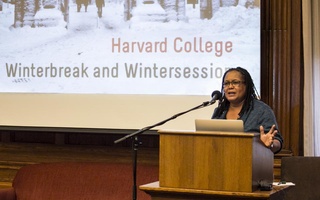Recruiting season has come to Harvard, and while the rest of us are worrying about our midterms and papers, the Class of 2014 has begun the lengthy process of job searching. Many current seniors will go on to work for tech firms or investment banks, but if the last few years are any indicator, an equally substantial portion of them will apply to and take positions with Teach For America—a controversial program that aims to send highly-qualified college graduates to teach in high-need school districts for periods of two years. The program is not without its faults, but imperfection is no cause for condemnation. TFA is a worthwhile institution not only because it improves education for students across the country, but also because it is uniquely positioned to work toward positive change in our country’s educational system.
In America’s current educational system, students from top schools have little incentive to pursue careers as teachers. American teachers are expected to perform a very difficult job for relatively low salaries and are less valued culturally than most of their counterparts around the world. In most American school districts, hiring decisions are based upon seniority—which means that there is little job security for young, aspiring teachers. Looking for a place to begin a career, American college graduates see teaching as a low-paying option with little stability.
There are doubtless high-achieving students who choose teaching over more lucrative options, but the vast majority appears to do otherwise: Most students enrolled in four-year teaching programs graduated in the bottom half of their high school classes. This is certainly not to say that students who don’t graduate at the top of their classes cannot be fine educators. But equally certain is that there is something backward about a system of incentives that that fails to attract our top students to a profession so crucial to the nation’s future as teaching.
Teaching accreditation programs also seem to be doing a poor job of educating their students. In countries with world-renowned education systems like Finland, teaching programs appear to be much more rigorous and much more competitive. These countries also pay their teachers respectable salaries. Until America affords its teachers greater pay and respect, we simply cannot expect large numbers of highly qualified individuals to enter the profession.
Teach for America is valuable because it provides at least a temporary solution to America’s educational problems. By providing a secure and alluring temporary teaching position, it puts graduates from top schools into high-need schools across the country. Former corps members and their students largely attest to the program’s value, and may TFA members continue to teach or advocate for education reform. A recent study suggests that students learn math better from TFA teachers than from first-year teachers coming from traditional teacher-training programs.
The program is not without its problems, but critics should focus on improving the program rather than on calling for its dissolution. Some critics allege that the program does not provide enough training or support to new teachers, who often feel overwhelmed on the job. TFA should address this problem and be more meticulous about helping its recruits throughout their employment. The temporary nature of the position also makes it appear like a “quick fix” to a much larger problem—TFA should focus some energy on long-term problems like low teacher pay and dubious education programs, and on encouraging even more of its recruits to stay in the profession.
In an ideal world, teaching would attract enough highly qualified and motivated students that TFA would no longer serve a purpose. But that is not the world we live in. Until then, TFA should be seen as a positive force in improving the education of high-need students across the country.
Read more in Opinion
Citizen KeynesRecommended Articles
-
TINKER, TAILOR, SOLDIER, LAWYER?"I' m going to law school." The phrase is uttered with increasing frequency on college campuses these days. Sometimes it's
-
 UC Basketball Game Tailgate
UC Basketball Game Tailgate -
College Expands Summer Research ProgramsAfter successful pilot programs last summer, the College’s two new summer research programs have expanded their undergraduate research opportunities in the social sciences and business for the summer of 2012.
-
Union Leader Urges for Restructuring in EducationThe teaching profession in the United States needs a makeover, the president of America’s largest labor union—the National Education Association—said at the Graduate School of Education on Tuesday.
-
PBHA Programs Awarded Grants From Public Service FundForty-six public service programs received a total of over $150,000 from the College-run President’s Public Service Fund on Tuesday.
-
 Number of Wintersession Programs To Plateau
Number of Wintersession Programs To Plateau













